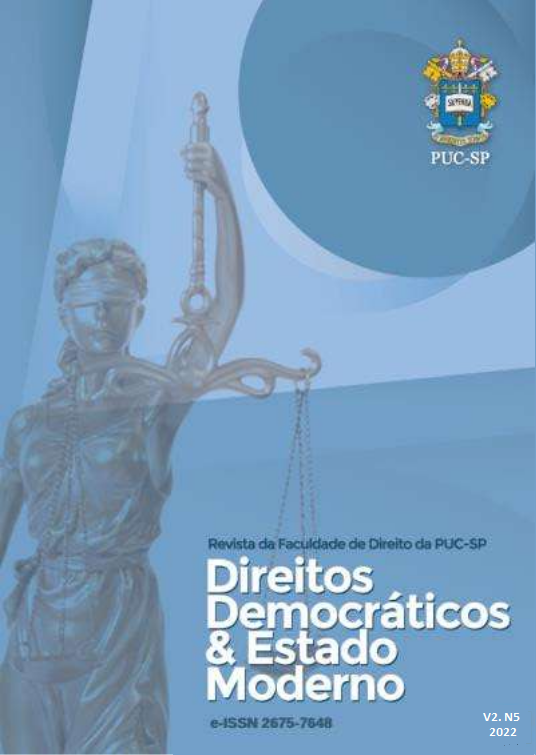Digital universe, fake news and policy
what democracy is being built in the virtual medium?
DOI:
https://doi.org/10.23925/ddem.v.2.n.5.56461Keywords:
digital universe, democracy, fake newsAbstract
The virtual universe is today rigorously central to social experience in various segments, something that certainly encompasses democracy. However, some problems already observed in the physical environment are transported to the digital universe, but as if they are amplified or at least quickly disseminated in the digital or virtual environment. One of these issues is the phenomenon of fake news. Inquiring, traversing, and seeking to answer what effects this phenomenon can have on democracy is the main objective of this study, developed in the hypothetical-deductive modality, taking the theoretical framework and the author's contributions as necessary subsidies for the generation of the conclusions presented herein.
References
ALLCOTT, Hunt; GENTZKOW, Matthew. Social Media and Fake News in the 2016.
ASANUM, Eduardo Seide; NAIWERTH, Rafaela Vieira. O processo de formação territorial brasileiro a partir da Revolta da Vacina – Rio de Janeiro/RJ (1904) associado com o movimento antivacina atual (COVID-19). Disponível em http://anais.uel.br/portal/index.php/contestado/article/view/934/1349, acesso em 21 de agosto de 2021.
AYUDA, Fernando Galindo. Democracia, internet y gobernanza: una concreción. Sequência (Florianópolis) nº 65 Florianópolis Dec. 2012, disponível em https://doi.org/10.5007/2177-7055.2012v33n65p33, acesso em 20 de julho de 2021.
BARRERA, Oscar; GURIEV, Sergei; HENRY, Emeric; ZHURAVSKAYA, Ekaterina. Facts, alternative facts, and fact checking in times of post-truth politics, disponível em https://www.sciencedirect.com/science/article/pii/S0047272719301859, acesso em 5 de julho de 2021.
CAMARGO JUNIOR, Kenneth Rochel de. Lá vamos nós outra vez: a reemergência do ativismo antivacina na Internet. Cad. Saúde Pública, Rio de Janeiro, v. 36, n. 14, e00037620, fev. 2020. Disponível em: http://cadernos.ensp.fiocruz.br/csp/artigo/1151/la-vamos-nos-outra-vez-a-reemergencia-do-ativismo-antivacina-na-internet. Acesso em 15 de agosto de 2021.
DELLEUZE, Gilles. Mediators. “Negotiations”, New York, 1995, p. 121.
DIETHELM, Pascal; MCKEE, Martin. Denialism: what is it and how should scientists respond?. European Journal of Public Health, Volume 19, Issue 1, January 2009, Pages 2–4, disponível em https://doi.org/10.1093/eurpub/ckn139, acesso em 23 de julho de 2021.
Election. Disponível em https://web.stanford.edu/~gentzkow/research/fakenews.pdf, acesso em 6 de julho de 2021.
HAN, Byung-Chul. Psicopolitica – Neoliberalismo e as novas técnicas de poder. Belo Horizonte: Âyiné, 2018, pp. 16 e 21.
KAPLAN, Robert D. À beira da anarquia: destruindo os sonhos da era pós-guerra fria. São Paulo: Futura, 2000, p. 126.
LEYVA, Rodolfo; BECKETT, Charlie. Testing and unpacking the effects of digital fake news: on presidential candidate evaluations and voter support, disponível em https://link.springer.com/article/10.1007/s00146-020-00980-6, acesso em 6 de julho de 2021.
NOGUEIRA Daniela. Fake News. O outro vírus que a pandemia alastrou nas nossas vidas, disponível em https://ionline.sapo.pt/artigo/724836/fake-news-o-outro-virus-que-a-pandemia-alastrou-nas-nossas-vidas?seccao=Portugal_i, acesso em 20 de julho de 2021.
ORTIZ, Renato. Mundialização e Cultura. Brasiliense: São Paulo, 1994.
ROTHENBURG, Walter Claudius e; STROPPA, Tatiana. Liberdade de expressão e discurso do ódio: o conflito discursivo nas redes sociais. Disponível em https://www.ufsm.br/app/uploads/sites/563/2019/09/6-21.pdf, acesso em 21 de julho de 2021.
SCOTT, Eugenie Carol. Antievolution and Creationism in the United States. Annual Review of Anthropology, Vol. 26 (1997), pp. 263-289, disponível em http://www.jstor.org/stable/295252, acesso em 23 de julho de 2021.
SILVA, Renata Nascimento da. A máscara obscura do ódio racial: segregação, anonimato e violência nas redes sociais. Dissertação de mestrado. Niterói: Universidade Federal Fluminense, 2018.
SRISKANDARAJAH, Ike. Where did the microchip vaccine conspiracy theory come from anyway? Disponível em https://www.theverge.com/22516823/covid-vaccine-microchip-conspiracy-theory-explained-reddit, acesso em 15 de agosto de 2021.
ZYGMUNT, Bauman. Modernidade líquida. Rio de Janeiro: Jorge Zahar, 2001.
Downloads
Published
How to Cite
Issue
Section
License
Copyright (c) 2022 Democratic Rights & Modern State

This work is licensed under a Creative Commons Attribution 4.0 International License.
This work is licensed under a License Creative Commons Atribuição 4.0 Internacional.
The authors grant the journal all copyrights relating to the published works. The concepts issued in signed articles are the absolute and exclusive responsibility of their authors.
DD&EM Magazine - ISSN 2675-7648

















